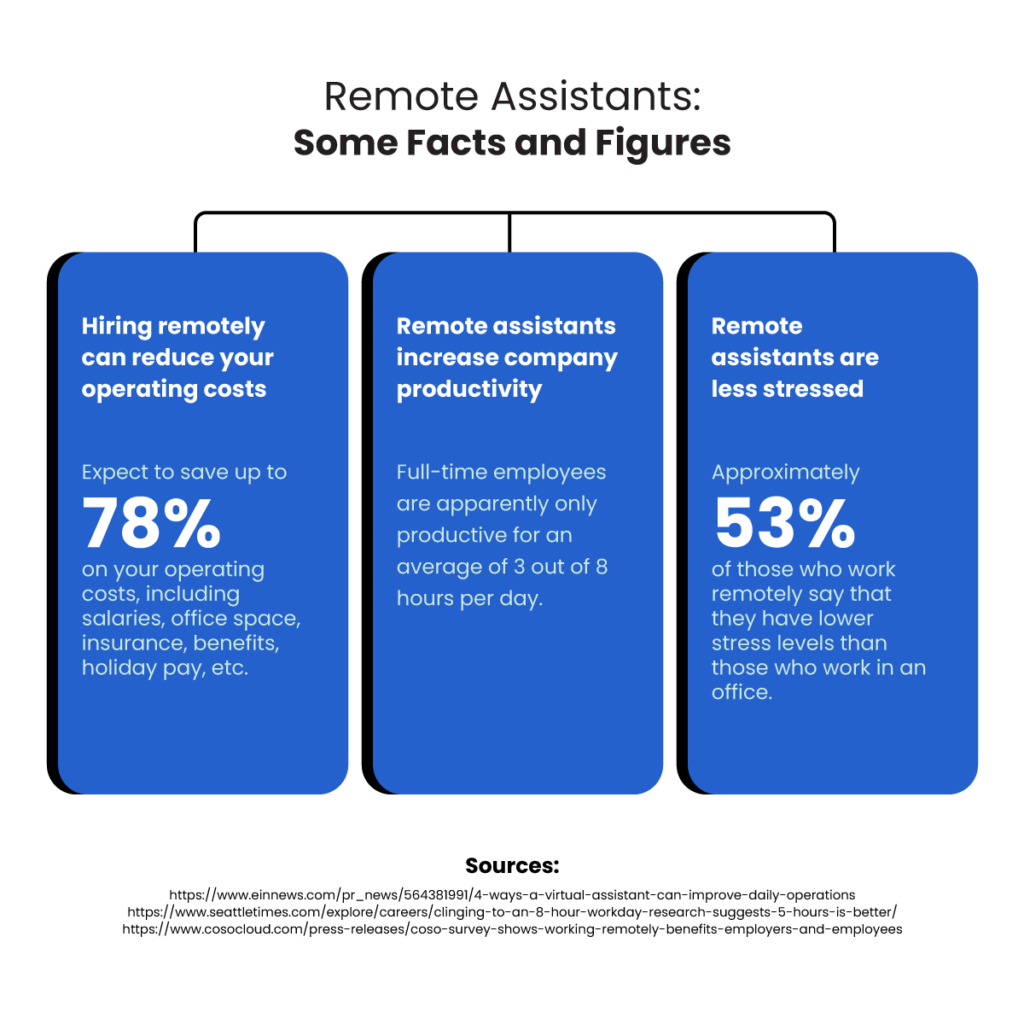There are many moving parts to running a company. Often, these parts are more than any one person can take on (even if you’re Superman). When first starting a business, you might be handling everything yourself, from marketing and finances to customer communication. But it’s not sustainable in the long term, and you’ll soon find yourself on the verge of burnout. And that is why companies outsource.
You don’t have to give up the reins of your company to contractors and freelancers. Instead, you can outsource more tedious tasks to skilled and experienced talent. This lets you focus on more high-impact, large-scale ones. You’re the brains behind the company, but you might not be a social media guru or be great with numbers. But the person you outsource could be.
Let’s look at why companies outsource work and how doing so directly impacts business success.
The rise of remote work has accelerated outsourcing
Global Workplace Analytics estimates that approximately 56% of current employees in the United States are technically remote workers. This figure does not even include self-employed professionals. And the workforce is starting to take notice. Many workers realized that they preferred working from home due to the shelter at home rules various governments around the world implemented during COVID-19.
On the flip side, companies have also realized that staff can do their jobs just as well from home as they can from the office, making an office a potentially unnecessary expense. Other operating costs include salaries of employees, their benefits packages, insurance, office equipment, and the like.
By outsourcing work to contractors and freelancers, companies can save on those costs and access a global marketplace of skilled talent. Instead of having to hire from a pool of talent in the local area, you can hire contractors from anywhere in the world.
Why companies outsource to remote assistants: statistics to note
Before jumping into the world of outsourcing, you’ll want to understand how it can benefit you and what you’re getting into. Here are some stats to give you an idea of what hiring a remote assistant might look like for your company:
Hiring remote assistants can reduce your operating costs by 78%
By hiring a remote assistant vs. hiring a full-time employee, you can expect to save up to 78% on your operating costs. This takes into account salary, office space, insurance, benefits, holiday pay, etc.
Over half of remote assistants work an average of 2 and a half days per week.
When you hire a remote assistant, it doesn’t have to be full-time. You can simply hire them for the hours and tasks you need them for without committing to a full-time salary.
Hiring a remote assistant can make your company 13% more productive
Outsourcing tasks like customer service emails, database management, and email marketing to a remote assistant can make your business run much smoother. You can have them track their time and focus on their assigned tasks, getting things done much quicker than salaried employees trying to multi-task.
Research suggests that when companies employ staff in the traditional 9-to-5 office environment, they are only productive for an average of 3 hours out of 8 hours per day. When companies outsource, they get more value out of their human resources.
Over half of remote workers claim their stress levels are lower
According to CoSo Cloud approximately 53% of those who work remotely say that they have lower stress levels than those who work in an office. There are many reasons for this, including lack of commute and a more comfortable workspace. This leads to remote assistants being more satisfied in their job and therefore performing better.
Popular remote assistant tasks include project management, email marketing, and social media management
While many companies outsource general admin tasks, customer service, sales, and data entry, the skills highest in demand are project management, email marketing, and social media management. These are essential aspects of every company, but also those that are relatively easy to outsource.

Why companies outsource: its advantages
There are many advantages to outsourcing a remote assistant or contractor. Here are some of the top ways that outsourcing can change the trajectory of your business.
It lets you access top-tier talent from elsewhere
Regardless of where your company is based, finding top-tier local talent can often be tedious. Obviously, if you’re in a small town, there are just fewer people to choose from. But even in a big city, it can be hard to find exactly what you’re looking for. Outsourcing allows you to access a global bank of talent. You can hire from anywhere in the world, and it’s also easier to find skilled talent using online platforms like Wing, who will set you up with experienced, qualified remote assistants.
Why companies outsource? It’s good for the bottom line
It’s cheaper. Way cheaper. As discussed above, outsourcing remote staff can save you almost 78% of your operating costs. Since you’re only paying for the tasks and hours of work you need, you won’t be throwing money down the drain on wasted, low productivity hours. You also don’t have to invest money in training or equipment for your staff since you can outsource talent who are already skilled in precisely what you need. And when you outsource, you don’t need to worry about paying for health insurance, benefits packages, or an office space.
Outsourcing helps create more efficient processes
Strategically managing your staff and allocating tasks appropriately makes your business more efficient. Efficiency saves you money, helps things operate smoothly, and gives you the potential for continued growth. Often, when you aren’t outsourcing lower-level tasks, like general admin and processing, they get left to someone else, or you try to find time to do them yourself. This leads to them getting left until the last minute and usually completed without much care or motivation.
Outsourcing helps you build more efficient processes, where tasks are completed in good time and at a higher quality. You can increase your business’s task output, becoming more productive overall. That means tasks are done in less time, for less money producing more outcomes.
Why companies outsource? It frees up time for execs
Consider how much of your time you spend on daily admin tasks. Responding to emails, scheduling meetings, researching, generating invoices, organizing folders, etc., takes up so much of your valuable time. There are many more higher-level tasks that require your attention, so it’s essential to outsource as much as possible. By ensuring you have qualified assistants to take care of everything, you can focus on brand development, long-term business strategy, and being the face of your business.
It lets managers leverage innovations and technology
Productivity has become an industry in and of itself. There are amazing tools and resources specifically designed to help business owners optimize their processes and improve efficiency. But have you ever had the chance to tap into these new tech innovations? When you or your employees have always done things a certain way, and it’s worked up until this point, you may not even consider changing things up.
Skilled contractors who are up-to-date with new technology can help you to optimize your processes by implementing new systems. These include project management software, CRM software, communication tools, email marketing software, social media management tools, and time tracking software.
What are the disadvantages of outsourcing?
As with all things, there are some challenges and disadvantages of outsourcing rather than working with an on-site team or on your own. If there are good reasons why companies outsource, there are equally compelling reasons they don’t.
You lose a degree of control
It can be hard to give up control over your business tasks. After all, you know your business better than anyone and have the motivation and commitment for it to succeed. Outsourcing tasks means trusting others to have the same degree of passion and commitment to your business as you. And the reality is, they may not.
Micromanaging is never a good idea, and will take up a lot of unnecessary energy, so you will need to release control. That said, investing in quality contractors means finding talent who are fantastic at what they do and might even be more proficient at performing specific tasks than you are.
Synchronization can be challenging
Outsourcing means that your staff will be spread across the country, or even the world, making it harder for your team to stay in sync. Your team needs to share your company vision and be on the same page when it comes to your business goals. There will be many occasions when you need to share information and coordinate on tasks, and even with video conferencing tools like Zoom and Google Meet, it’s easy for miscommunication to occur.
That is why it’s incredibly important to use the collaboration tools at your disposal when working with a remote team. Make use of cloud tools like Google Drive to share documents and spreadsheets. Use Loom to record onboarding videos to explain how to perform tasks clearly. Utilize communication tools like Slack and ensure your team is available during specified hours. Leveraging these tools will help you overall the synchronization barrier of working with a remote team.
There might be a lack of customer focus
No matter what industry you’re in, without happy customers, you have no business. Obviously, you will put the most care into dealing with your customers, but handling all customer communication can take a lot of time. Although it’s one of the easiest tasks to outsource, you want to ensure that your remote assistants understand how you communicate with customers and the quality you expect.
Without getting incredibly specific, and taking the time to monitor the customer focus of your assistants, it can fall by the wayside. But as long as you place a lot of importance on customer focus and train your staff accordingly, you can ensure your customers are still treated the same way you would.
When should a company outsource?
If you’ve gone over the many reasons why companies outsource and think that you should, how do you know if it’s the right time to start offloading your business tasks? There are many clues that you should be outsourcing. The first sign is your stress level. Business owners often take on too much and burn out as a result. Don’t let yourself get to that point. If you’re feeling overly stressed on a daily basis, then it’s time to look at what you can get off your plate.
Another sign is if you feel like you have things you want to do in your business, but you can’t find the time. You should be spending time working ON your business, not just IN your business. There needs to be a healthy balance between the two, and if you don’t feel like you’re getting things done, it’s time to outsource.
Additionally, if you forget to do things, are unable to focus on your customers, or notice that certain aspects of your business are struggling, it’s also a sign you need some support.
But, when should you not outsource? There are specific tasks that you shouldn’t outsource or don’t need to outsource. First of all, you should avoid outsourcing anything to do with legal compliance, company vision, restructuring, or core leadership. These are the areas that you, as a business owner, should always have total control over. Confidentiality is essential in core elements of your business, so make sure to maintain that when outsourcing your tasks.
What do companies outsource?
There are tons of different tasks that companies can outsource for their business. Here are some of the most common:
- Appointment scheduling
- Content writing
- Graphic design
- Social media management
- Travel coordination
- Content marketing
- Sales calling
- E-commerce
And more!
Why companies outsource: it’s perfect for today’s digital-first business environments
So now that you know why companies outsource, how can you go about outsourcing yourself? The best way to start outsourcing talent for your business is using a service like Wing Assistant. You tell us exactly what you’re looking for, and we set you up with a qualified and dedicated assistant who is already verified—no going through endless resumes, no scheduling multiple interviews. Get started with a Wing Assistant today!
Kandice is a content writer & strategist with over 5 years of experience in digital marketing. She specializes in SEO-optimized content for the SaaS and tech industry. She’s a digital nomad, currently based in Mexico, and is passionate about helping other business owners and freelancers increase their productivity when working remotely. When she’s not behind her computer you’ll find her at the beach snorkeling, playing volleyball, doing yoga, or cooking up a delicious vegan meal.






